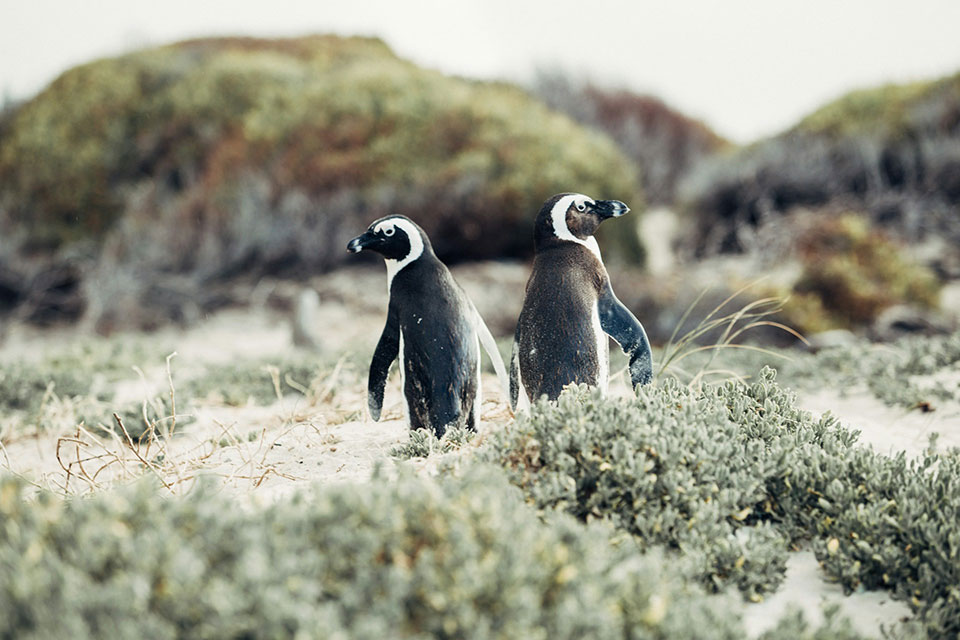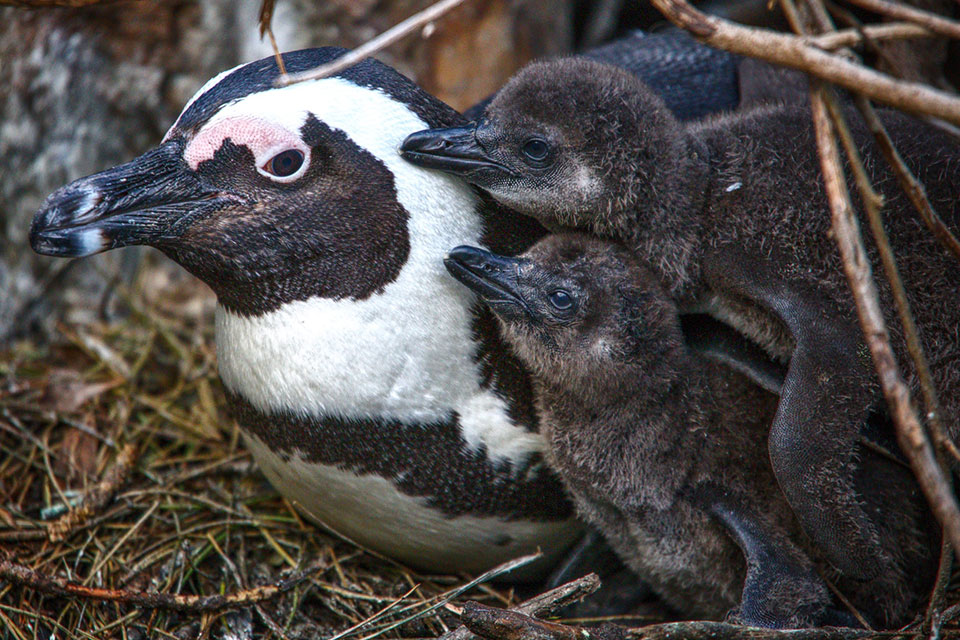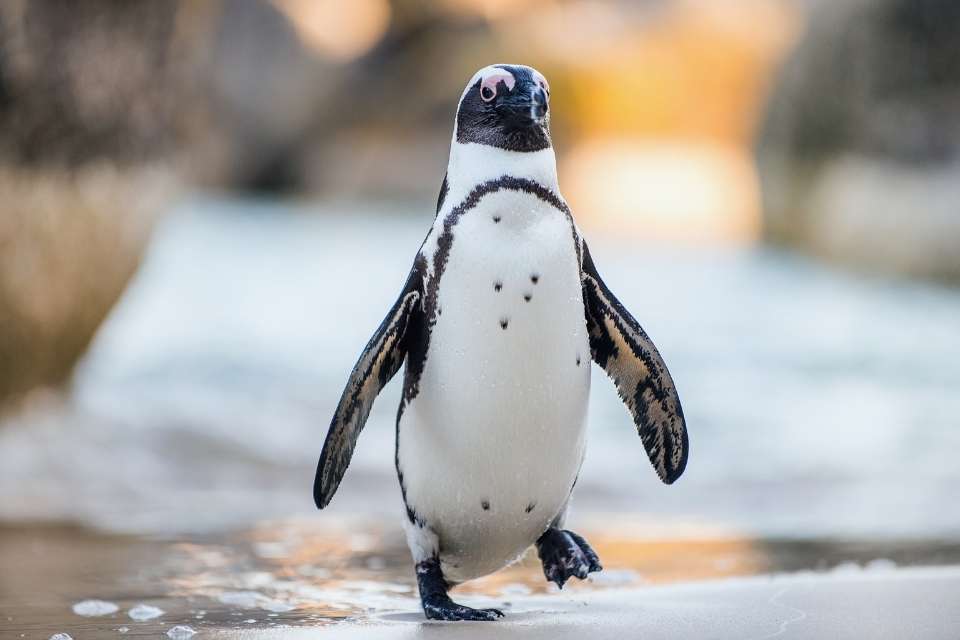We, as conservationists, recognize the importance of African penguins in our efforts to preserve the natural world. These charming creatures play a vital role in maintaining the delicate balance of our ecosystem.
Let us delve into why African penguins hold such significance and why their conservation is crucial for our planet.
Key Takeaways
- African penguins are essential for maintaining the ecosystem’s balance as they serve as both predators and prey.
- The population of African penguins has drastically declined, making them an endangered species.
- Conservation efforts focus on protecting African penguins from threats such as habitat destruction, oil spills, and competition with fisheries.
- African penguins contribute to ecotourism, acting as an attraction for visitors eager to observe their behavior in their natural habitat.
- Preserving and restoring African penguin populations is vital not only for their survival but also for the overall health of our environment.
The Threats Facing African Penguins

The African penguin population is currently classified as endangered by the International Union for Conservation of Nature (IUCN).
Over the past decades, there has been a significant decrease in the number of breeding pairs, highlighting the urgent need for conservation efforts to protect these iconic birds.
African penguins face a multitude of threats that contribute to their population decline. Egg harvesting, both for consumption and historical demand by French chefs, has had a severe impact on their numbers.
Oil spills and marine pollution have polluted their habitat, affecting their survival and breeding performance.
Competition with commercial fisheries and the decline of their primary food sources, such as sardines and anchovies, have resulted in food scarcity for African penguins. Predation by seals, gulls, caracals, leopards, mongoose, feral cats, and domestic dogs also pose a significant threat.
Disease outbreaks, including avian influenza, have caused mortality among African penguins.
Protecting the habitat of African penguins and reducing human disturbance are crucial for their survival. The destruction of their nesting and breeding sites, along with disturbances caused by human activities, further exacerbate their vulnerability.
By addressing these threats, we can help prevent further decline and promote the recovery of African penguin populations.
“The decline of African penguins not only poses a threat to the species itself but also has wide-ranging impacts on the ecosystem. These birds play a vital role in maintaining the balance of the marine ecosystem by serving as a food source for predators like sharks and seals and acting as predators to small fish such as anchovies and sardines. Protecting African penguins is not only important for their conservation but also for the overall health and stability of the ecosystem.”
The Importance of Conservation and Restoration
Conservation plays a vital role in securing the future of African penguins and the ecosystems they inhabit. By focusing on the protection and restoration of their habitat, we can ensure the survival of these incredible creatures for generations to come.
One of the key conservation efforts is the creation of safe breeding areas closer to important food sources. For example, the establishment of an African penguin colony at De Hoop Nature Reserve has provided a sanctuary where these birds can thrive.
By providing a suitable environment and reducing human disturbance, we are helping to promote their population recovery.
Additionally, ongoing efforts include providing increased shade, developing artificial nest boxes, and implementing early warning systems for extreme climatic events.
These measures aim to create optimal conditions for breeding and ensure the survival of African penguins throughout their life cycle.
However, conservation efforts alone are not sufficient. To truly protect African penguins, we must address the root causes of their decline. This includes addressing climate change and unsustainable human practices.
By investing in sustainable energy resources, holding oil companies accountable, and reducing our carbon footprints, we can mitigate the impacts of the climate crisis on African penguins and other threatened species.
Conclusion
African penguin conservation is a topic of great importance. Why are African penguins important? They are important because they are a vulnerable species and their population is in decline.
African penguins are also important because they are a keystone species in the ecosystem. A keystone species is a species that has a disproportionately large effect on its ecosystem.
African penguins help to keep the ecosystem in balance and their decline could lead to an imbalance in the ecosystem.
There are many reasons for the African penguin population decline. One of the main reasons is overfishing. African penguins eat small fish such as anchovies and sardines.
These fish are also popular with humans and are often overfished. This means that there are less fish for the African penguins to eat and this can lead to starvation. Another reason for the population decline is oil spills.
Oil spills can contaminate the water and the food that the penguins eat. Oil can also coat the feathers of the penguins and this can make it difficult for them to keep warm. Oil spills can also cause death if the penguins ingest the oil.
The good news is that there are many things that can be done to help African penguins. One of the things that can be done is to reduce overfishing. This can be done by creating Marine Protected Areas (MPAs).
MPAs are areas of the ocean where fishing is not allowed. This will help to ensure that there are enough fish for the penguins to eat. Another thing that can be done is to clean up oil spills quickly.
This will minimize the amount of oil that the penguins are exposed to and will help to keep them healthy.
There are many other things that can be done to help African penguins, but these are two of the most important. African penguin conservation is important because African penguins are a keystone species in the ecosystem and their population is in decline.
By taking action to reduce overfishing and clean up oil spills, we can help to ensure that African penguins are around for generations to come.
FAQ
Why are African penguins important?
African penguins play important roles in maintaining the ecosystem. They serve as a food source for sharks and seals, and also act as predators to small fish such as anchovies and sardines.
What is the current conservation status of African penguins?
The population of African penguins has declined over 95% since pre-industrial times and the species is currently listed as endangered.
What are the main threats facing African penguins?
The decline of African penguins is a result of various factors, including climate change, human activity, and habitat destruction.
What conservation efforts are being made to protect African penguins?
Conservation efforts include measures to reduce egg harvesting, oil spills, and competition with fisheries.
Are African penguins important for ecotourism?
Yes, African penguins have an economic importance as an attraction for ecotourism, providing opportunities for people to observe their behavior in their natural habitat.
How has the African penguin population been classified?
The African penguin population has been classified as endangered by the IUCN. Their population continues to decline, with a significant decrease in breeding pairs over the past decades.
What are the main threats to African penguins?
Threats to African penguins include egg harvesting, oil spills, food scarcity, predation, habitat destruction, disease, and human disturbance.
How do oil spills impact African penguins?
Oil spills and marine pollution have polluted their habitat and affected their survival and breeding performance.
Why are African penguins facing food scarcity?
African penguins are facing food scarcity due to competition with commercial fisheries and the decline of their primary food sources, sardines and anchovies.
What can be done to protect African penguins?
Protecting their habitat and reducing human disturbance, along with improving breeding success and ensuring sufficient food availability, are crucial in preventing further decline and promoting population recovery.
What conservation efforts are ongoing for African penguins?
Conservation efforts include providing increased shade, creating artificial nest boxes, and developing early warning systems for extreme climatic events.
How are oiled and diseased penguins rescued?
Rescuing oiled and diseased penguins, rehabilitating them, and releasing them back into the wild are key conservation actions.
How can fish availability be improved for African penguins?
Restricting commercial fishing near colonies and addressing declining fish stocks can help improve food availability for African penguins.
What can be done to address predation on African penguins?
Reducing human disturbance at colonies and implementing measures to prevent predation are important for their survival.
Can establishing new breeding areas help African penguin population recovery?
Creating safe breeding areas closer to important food sources, such as the establishment of an African penguin colony at De Hoop Nature Reserve, can contribute to their population recovery.
Are conservation efforts alone enough to save African penguins?
No, conservation efforts alone are not enough to save African penguins. Addressing the root causes of their decline, such as climate change and unsustainable human practices, is crucial for their long-term survival.
What can governments and individuals do to help African penguins?
Governments and individuals need to invest in sustainable energy resources, hold oil companies accountable, and reduce carbon footprints to mitigate the impacts of the climate crisis on African penguins and other threatened species.


